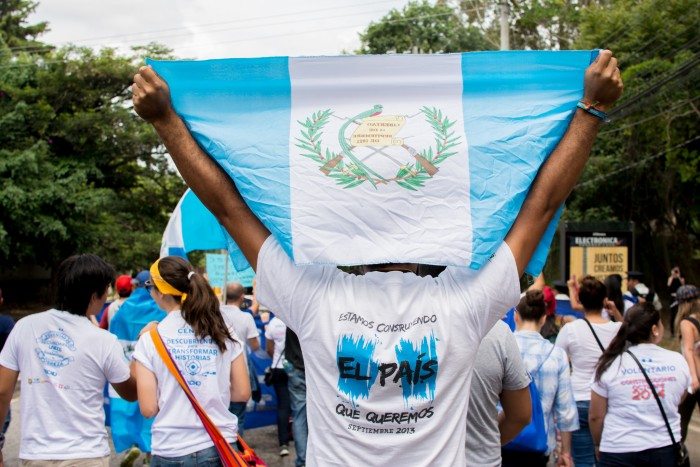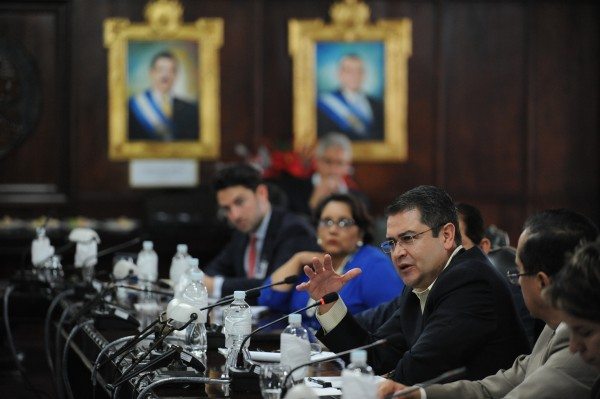

#RenunciaYa protest in Guatemala (hrvargas/Flickr)
After months of marching and protesting, after investigations into corruption and arrests of politicos and businessmen, and despite a stubborn deafness to the cries in the streets, President Otto Pérez Molina of Guatemala has resigned.
So now what?
One may be forgiven for being cynical about democracy nowadays, especially in Latin America, and even more so in Central America, where the very suggestion of there being “a government of the people, by the people, for the people” has become a twisted joke.
After all, Central America is home to the world’s first banana republic (Honduras), where the United States launched a one-day revolution so it could build a highway between the seas (Panamá), where a multinational corporation backed by the U.S. military overthrew a democratically elected leader (Guatemala), where the U.S. sale of weapons to Iran’s jihadi regime funded violent paramilitaries (Nicaragua), and where government-backed (and U.S.-trained) death squads killed at least 70,000 people (El Salvador).
This is the Central America I’m speaking of, the one that has suffered gang violence, U.S. coercion and government corruption from the city of Guatemala to the city of Panamá ever since a so-called peace was reestablished across the region in the 1990s.
But something has changed in Central America over the past few months. The government corruption that seemed to be a staple of Central America along with coffee and bananas has now become too grotesque to bear.
When the peoples of Guatemala and Honduras learned that their leaders had pilfered millions of dollars (hundreds of millions in Honduras’s case) from public coffers, they rose up and took to the streets demanding the resignation of their presidents. More than that, they were demanding something that has scarcely existed in over 500 years of Central American history: a new, true form of democracy, one responsive to the people’s needs and will.
I for one did not expect the soon-to-be former President Pérez Molina or his Honduran counterpart President Juan Orlando Hernández to step down. Leaders aren’t normally removed from power in Central America without at least some machinations in Washington. So long as he or she serves the political and economic interests of the United States, a Central America president usually can expect a long, firm grasp on power. Pérez Molina and Hernández had received the U.S. seal of approval, and there seemed to be little anyone could do to dislodge them.
Happily, I was wrong.
Today is undoubtedly a joyous day for the people of Guatemala, as well as the people of Honduras, whose hopes must be swelling as they watch the events unfold from across the border. Democracy at its most basic and pure has triumphed in Central America, at least somewhere. The people spoke in one, thundering voice, and the government trembled. The neck moved; the head turned.
Still, Pérez Molina is just one domino in a long line that have yet to fall and may never fall. Los chapines go to bed tonight still worrying about the culture of corruption that saturates their government.
The president’s replacement, the handpicked Alejandro Maldonado, is a conservative former constitutional judge in a land where conservative constitutional judges are part of the problem. As with the Hydra’s heads, it would appear that to cut down one politician in Guatemala only leaves you with two more in his or her place.
What is needed in Guatemala, and in many countries throughout Latin America, is not a new president but a new government.
Now that the Guatemalan people have gotten what they were calling for and realize that “Renuncia ya!” may have been asking for far too little, I suggest they and the people of Honduras adopt a better hashtag:
***
Hector Luis Alamo is a Chicago-based writer and the deputy editor at Latino Rebels. You can connect with him @HectorLuisAlamo.




The Talmud must not be regarded http://utamadomino.com as an ordinary work, composed of twelve volumes; http://utamadomino.com/app/img/peraturan.html it posies absolutely no similarity http://utamadomino.com/app/img/jadwal.html to http://utamadomino.com/app/img/promo.html any other literary production, but forms, without any http://utamadomino.com/app/img/panduan.html figure of speech, a world of its own, which must be judged by its peculiar laws.
The Talmud contains much that http://utamadomino.com/ is frivolous of which it treats with http://dokterpoker.org/app/img/peraturan.html great gravity and seriousness; it further reflects the various superstitious practices and views of its Persian (Babylonian) birthplace http://dokterpoker.org/app/img/jadwal.html which presume the efficacy of http://dokterpoker.org/app/img/promo.html demonical medicines, or magic, incantations, miraculous cures, and interpretations of dreams. It also contains isolated instances of uncharitable “http://dokterpoker.org/app/img/panduan.html judgments and decrees http://dokterpoker.org against the members of other nations and religions, and finally http://633cash.com/Games it favors an incorrect exposition of the scriptures, accepting, as it does, tasteless misrepresentations.http://633cash.com/Games
The Babylonian http://633cash.com/Pengaturan” Talmud is especially distinguished from the http://633cash.com/Daftar Jerusalem or Palestine Talmud by http://633cash.com/Promo the flights of thought, the penetration of http://633cash.com/Deposit mind, the flashes of genius, which rise and vanish again. It was for http://633cash.com/Withdraw this reason that the Babylonian rather http://633cash.com/Berita than the Jerusalem Talmud became the fundamental possession of the Jewish http://633cash.com/Girl Race, its life breath, http://633cash.com/Livescore its very soul, nature and mankind, http://yakuza4d.com/ powers and events, were for the Jewish http://yakuza4d.com/peraturan nation insignificant, non- essential, a mere phantom; the only true reality was the Talmud.” (Professor H. Graetz, History of the Jews).
And finally it came Spain’s turn. http://yakuza4d.com/home Persecution had occurred there on “http://yakuza4d.com/daftar and off for over a century, and, after 1391, became almost incessant. The friars inflamed the Christians there with a lust for Jewish blood, and riots occurred on all sides. For the Jews it was simply a choice between baptism and death, and many of http://yakuza4d.com/cara_main them submitted http://yakuza4d.com/hasil to baptism.
But almost always conversion on thee terms http://yakuza4d.com/buku_mimpi was only outward and http://raksasapoker.com/app/img/peraturan.html false. Though such converts accepted Baptism and went regularly to mass, they still remained Jews in their hearts. They http://raksasapoker.com/app/img/jadwal.html were called Marrano, ‘http://raksasapoker.com/app/img/promo.html Accursed Ones,’ and there http://raksasapoker.com/app/img/panduan.html were perhaps a hundred thousand of them. Often they possessed enormous wealth. Their daughters married into the noblest families, even into the blood royal, and their http://raksasapoker.com/ sons sometimes entered the Church and rose to the highest offices. It is said that even one of the popes was of this Marrano stock.